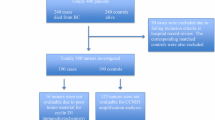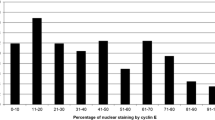Abstract
Background: Cyclin D1 (CCND1) and its catalytic partner cyclin-dependent kinase 4 (cdk4) are known to play important roles in the G1/S check point of the cell cycle, and CCND1 overexpression has been reported to correlate with progression and prognosis of breast cancers. Oestrogen receptor (ER) levels determine the proliferative response to oestrogen by regulating binding. It has been postulated that CCND1 and cdk4 exert effects on mammary carcinogenesis in co-operation with ER. Patients and methods: CCND1 and cdk4 overexpression in 117 breast cancer cases with long-term follow-up were investigated by means of immunohistochemistry and differential polymerase chain reaction (PCR), using formalin-fixed and paraffin-embedded samples, and compared with ER status and mitotic indices. Additional Western blotting and reverse transcription (RT)/PCR/Southern blot hybridization were performed for 4 breast cancer cell lines and 15 fresh-frozen breast cancer samples to confirm CCND1 and cdk4 data. Results: Immunohistochemically 27 cases were CCND1-positive (23.0%), and CCND1 amplification was evident in 21 (21/86; 24.4%). The two methods in combination demonstrated 37 cases (31.6%) to be positive for CCND1 overexpression. Western blotting revealed 60% of samples of fresh tissue to overexpress CCND1, corresponding well with the results of RT-PCR. There was thus a strong discrepancy between results for paraffin block and fresh samples, probably because of the short life of CCND1. In the case of cdk4, the respective percentages for positive cases were 54.7% and 73%. CCND1 and cdk4 overexpression (P < 0.0001), and CCND1 and ER positivity (P = 0.0128) correlated. In addition, samples overexpressing CCND1, cdk4 and ER tended to have slightly lower proliferative activity than samples where these were absent. However, no association with clinicopathological parameters was evident. cdk4 overexpression had no linkage with ER status or clinicopathological status. Neither CCND1 nor cdk4 expression affected prognosis. Conclusion: CCND1 overexpression does not correlate with cancer progression or prognosis or with mitotic activity. The results may suggest that an excess accumulation of CCND1 in breast cancer cells tends to suppress entry into the S phase of the cell cycle.
Similar content being viewed by others
Author information
Authors and Affiliations
Additional information
Received: 18 November 1998 / Accepted: 22 February 1999
Rights and permissions
About this article
Cite this article
Takano, Y., Takenaka, H., Kato, Y. et al. Cyclin D1 overexpression in invasive breast cancers: correlation with cyclin-dependent kinase 4 and oestrogen receptor overexpression, and lack of correlation with mitotic activity. J Cancer Res Clin Oncol 125, 505–512 (1999). https://doi.org/10.1007/s004320050309
Issue Date:
DOI: https://doi.org/10.1007/s004320050309




